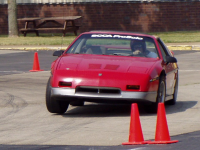Question about latency
- Nemo1966
-
 Topic Author
Topic Author
- Offline
- New Member
-

Less
More
- Posts: 16
- Thank you received: 0
08 Apr 2018 13:55 #108599
by Nemo1966
Question about latency was created by Nemo1966
Hi, looking for a PC for Linuxcnc - found a nice dual core in the loft, but the lowest I can get the latency down to is 20,000ns. So I started looking at other 'recommended' PC hardware (what a minefield that is - probably the biggest reason peoople seem to go with mach3).
Anyway after many hours looking for a good Linuxcnc PC I found this quote on this very forum -
I fully intend to get these cards anyway, so my question is - is his correct? Does adding the combo negate the latency issues with a linuxcnc PC?
thank you
Steve
Anyway after many hours looking for a good Linuxcnc PC I found this quote on this very forum -
add Mesa 5i25 and 7i76 combo and latency becomes irrelevant.
I fully intend to get these cards anyway, so my question is - is his correct? Does adding the combo negate the latency issues with a linuxcnc PC?
thank you
Steve
Please Log in or Create an account to join the conversation.
- Todd Zuercher
-

- Away
- Platinum Member
-

Less
More
- Posts: 4696
- Thank you received: 1439
08 Apr 2018 14:24 #108605
by Todd Zuercher
Replied by Todd Zuercher on topic Question about latency
20000 latency is good enough for most software stepping. What max feed rates and step resolution do you need?
The following user(s) said Thank You: Nemo1966
Please Log in or Create an account to join the conversation.
- PCW
-

- Offline
- Moderator
-

Less
More
- Posts: 17691
- Thank you received: 5173
08 Apr 2018 14:35 #108606
by PCW
Replied by PCW on topic Question about latency
For step/direction driven machines, adding any (General Mechatronics, Mesa, PicoSystems, etc) step generation hardware makes LinuxCNC much less dependent on low PC latency.
This is because the high frequency step generation is done in hardware and normally no high speed base thread is run on the PC, only the servo thread. Typically the servo thread runs at 1 KHz. This is about 10 to 100 times slower than the base thread and its much easier to meet the 1 ms timing deadline of the servo thread than a 10-100 usec base thread. This means the range of usable PC (or non pc) hosts is greatly expanded.
The bottom line is that LinuxCNC still requires real time with hardware step generation but the timing requirements
are very significantly relaxed.
This is because the high frequency step generation is done in hardware and normally no high speed base thread is run on the PC, only the servo thread. Typically the servo thread runs at 1 KHz. This is about 10 to 100 times slower than the base thread and its much easier to meet the 1 ms timing deadline of the servo thread than a 10-100 usec base thread. This means the range of usable PC (or non pc) hosts is greatly expanded.
The bottom line is that LinuxCNC still requires real time with hardware step generation but the timing requirements
are very significantly relaxed.
The following user(s) said Thank You: Nemo1966
Please Log in or Create an account to join the conversation.
- Nemo1966
-
 Topic Author
Topic Author
- Offline
- New Member
-

Less
More
- Posts: 16
- Thank you received: 0
08 Apr 2018 15:19 #108607
by Nemo1966
Replied by Nemo1966 on topic Question about latency
Steps Per is 1000 and mm per minute is 1200.
thanks
thanks
Please Log in or Create an account to join the conversation.
- Nemo1966
-
 Topic Author
Topic Author
- Offline
- New Member
-

Less
More
- Posts: 16
- Thank you received: 0
08 Apr 2018 15:25 #108609
by Nemo1966
Lovely answer - thank you
Replied by Nemo1966 on topic Question about latency
For step/direction driven machines, adding any (General Mechatronics, Mesa, PicoSystems, etc) step generation hardware makes LinuxCNC much less dependent on low PC latency.
This is because the high frequency step generation is done in hardware and normally no high speed base thread is run on the PC, only the servo thread. Typically the servo thread runs at 1 KHz. This is about 10 to 100 times slower than the base thread and its much easier to meet the 1 ms timing deadline of the servo thread than a 10-100 usec base thread. This means the range of usable PC (or non pc) hosts is greatly expanded.
The bottom line is that LinuxCNC still requires real time with hardware step generation but the timing requirements
are very significantly relaxed.
Lovely answer - thank you
Please Log in or Create an account to join the conversation.
Time to create page: 0.060 seconds
